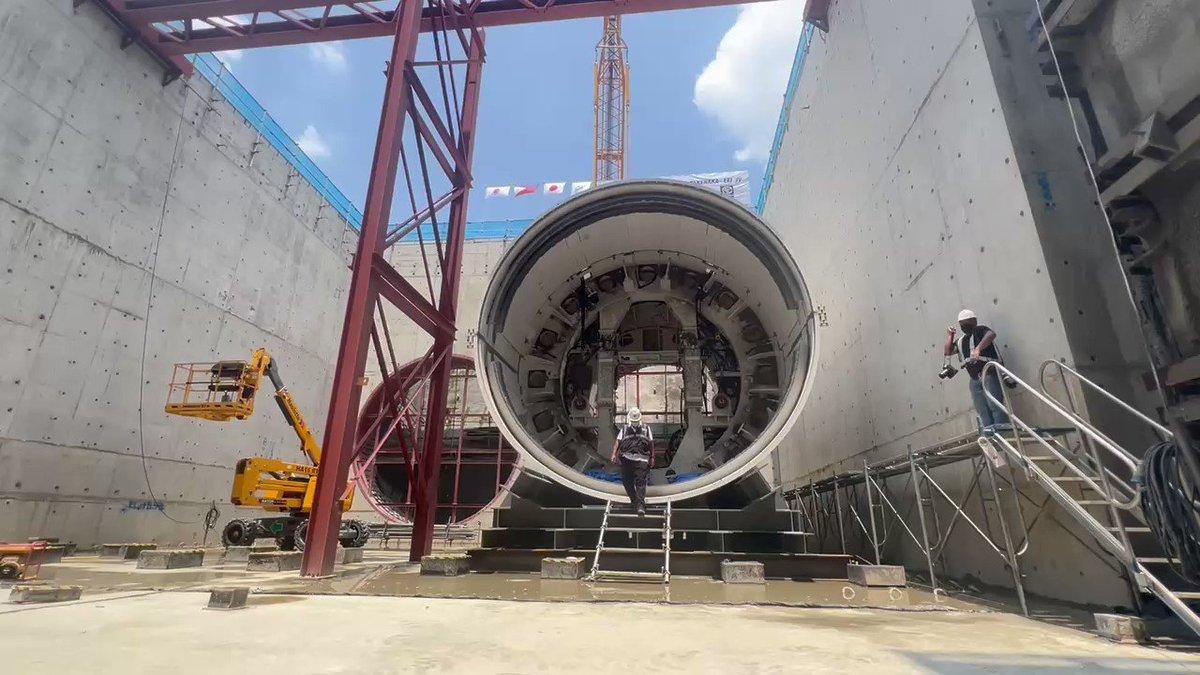
3 minute read
MARCOS KEEN ON PURSUING ‘GRANDER, MORE AMBITIOUS’ INFRA PROJECTS
President Ferdinand “Bongbong” Marcos Jr. said his administration is eyeing to pursue “grander” and “more ambitious” infrastructure projects to create jobs, improve connectivity, and provide convenience to Filipino commuters.
Marcos made this remark during the groundbreaking rites for the construction of the Ortigas and Shaw Boulevard stations of the Metro Manila Subway Project (MMSP) at Metrowalk Commercial Complex in Pasig City.
“Let the breaking ground of this subway system signal our intention to the world to pursue even grander dreams and more ambitious endeavors that will bring comfort and progress to our people all over the country,” Marcos said in his speech.
He reassured the public of his administration’s commitment to not only continue but also expand the government’s infrastructure program.
“Be assured that this administration will take the lead in identifying, pursuing, and implementing projects as part of the Build Better More Infrastructure Agenda that we have laid out,” he added.
Marcos also expressed hope that Filipinos’ aspirations for a “better, brighter, and more prosperous” country enkindle their purpose to work for the nation’s advancement.
‘Small inconveniences’
Meanwhile, Marcos said he looked forward to “brighter days” once the construction of the MMSP’s two stations is completed.
“Although it is a given that the construction of these structures will take time and cause disruption, let us be optimistic and just count these small inconveniences as a small price to pay for the fruitful results that this program, this project will yield,” he said.
He expressed hope that the project would be completed as scheduled so that the public may soon enjoy its benefits.
With the MMSP, Marcos said his administration anticipates helping people “skip long lines of traffic” and spare themselves from the “perils of commuting.”
He said the government also sees more business opportunities for entrepreneurs and investors, as well as additional economic activity with the improved linkages of key areas and business districts in the Metro and the availability of stalls and other stores in the stations and nearby markets.
“As our people gain more time by cutting long hours of travel, they can now engage in more worthwhile and productive endeavors, making time for greater self-improvement or equally important spending quality time with their families,” he said.
Joining Marcos at the event were Japanese Ambassador to the Philippines Ambassador Kazuhiko Koshikawa; Japan International Cooperation Agency (JICA) chief representative Takema Sakamoto; Senators Grace Poe, JV Ejercito, and Mark Villar; and Pasig City Mayor Vico Sotto
The MMSP is a foreign-assisted project under the Official Development Assistance program and funded by the JICA.
< Page 54
mining in the Philippines. Regarding environmental restoration and biodiversity, Semirara Mining and Power Corporation (SMPC) has conducted reforestation and biodiversity conservation goals, and reforestation and wildlife species propagation.
The company is currently studying and developing a concrete carbon transition roadmap. Part of SMPC’s strategy is to continuously monitor new and emerging climate-change legislation measures. They also assess its impact on business sustainability and future growth. SMPC bagged the Special Submission Category in the 2021 ASEAN Energy Awards.
For oil and gas sector’s perspective on energy transition Atty. Jose Ma. Emmanuel A. Caral, Secretary of the Petroleum Association of the Philippines. He disclosed that while companies remained focused on exploring, developing and producing the conventional oil and gas business, other companies have already started to diversify, and have made explicit commitments to achieve net zero emissions by 2050.
Atty Caral noted that there is a relatively slight growth in energy mix for power generation particularly in the wind and solar energy. He mentioned that oil and gas companies should choose to support the UN-Paris Agreement, it can significantly reduce emissions and energy consumption; lower carbon energy, reduce investment in traditional oil and gas. Unfortunately, he said that the Philippines continues to be heavily dependent on conventional fuels for transportation (by land, air or sea). He concluded that energy security is the replacement of affordable energy source to consumers.

Reference:
PHEITI Website at https:// pheiti.dof.gov.ph/resources/











